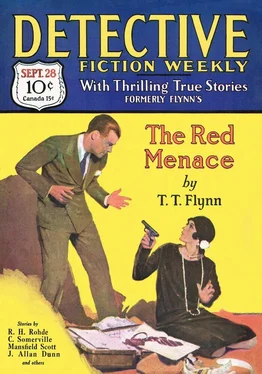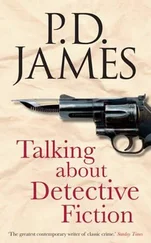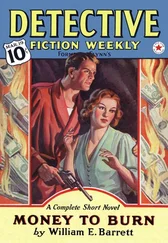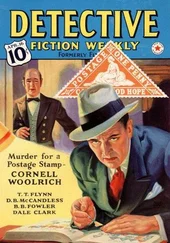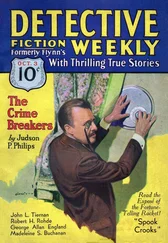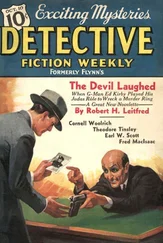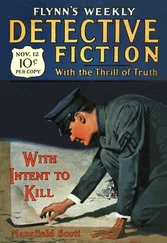Джон Данн - Detective Fiction Weekly. Vol. 44, No. 5, September 28, 1929
Здесь есть возможность читать онлайн «Джон Данн - Detective Fiction Weekly. Vol. 44, No. 5, September 28, 1929» весь текст электронной книги совершенно бесплатно (целиком полную версию без сокращений). В некоторых случаях можно слушать аудио, скачать через торрент в формате fb2 и присутствует краткое содержание. Город: New York, Год выпуска: 1929, Издательство: Red Star News Company, Жанр: Детектив, на английском языке. Описание произведения, (предисловие) а так же отзывы посетителей доступны на портале библиотеки ЛибКат.
- Название:Detective Fiction Weekly. Vol. 44, No. 5, September 28, 1929
- Автор:
- Издательство:Red Star News Company
- Жанр:
- Год:1929
- Город:New York
- ISBN:нет данных
- Рейтинг книги:4 / 5. Голосов: 1
-
Избранное:Добавить в избранное
- Отзывы:
-
Ваша оценка:
- 80
- 1
- 2
- 3
- 4
- 5
Detective Fiction Weekly. Vol. 44, No. 5, September 28, 1929: краткое содержание, описание и аннотация
Предлагаем к чтению аннотацию, описание, краткое содержание или предисловие (зависит от того, что написал сам автор книги «Detective Fiction Weekly. Vol. 44, No. 5, September 28, 1929»). Если вы не нашли необходимую информацию о книге — напишите в комментариях, мы постараемся отыскать её.
Detective Fiction Weekly. Vol. 44, No. 5, September 28, 1929 — читать онлайн бесплатно полную книгу (весь текст) целиком
Ниже представлен текст книги, разбитый по страницам. Система сохранения места последней прочитанной страницы, позволяет с удобством читать онлайн бесплатно книгу «Detective Fiction Weekly. Vol. 44, No. 5, September 28, 1929», без необходимости каждый раз заново искать на чём Вы остановились. Поставьте закладку, и сможете в любой момент перейти на страницу, на которой закончили чтение.
Интервал:
Закладка:
Then Burgess and Fitzpatrick “went to school.” At all hours. That is to say, they consulted with the principal, taking him into their confidence, and he afforded them a small room on the top floor of the schoolhouse which had a window directly overlooking the windows of the Preston apartment. For three days they watched, observing the comings and goings of Mrs. Preston, and the gambolings after school of Jack and his big, festive collie. But no sign was vouchsafed of Liverpool Jack.
If he were warily remaining away for a time while he established a counter-espionage on the detectives to find out if they were tracing him to his new abode, his measures had been ineffectual. Because on the fourth night of their vigil — they watched at night more assiduously than in the day, because it would be at such a time Liverpool Jack would be most likely to appear at his home — they saw a tall man, one who fitted Liverpool’s description, step down the street and enter the apartment house opposite. It was past two o’clock in the morning. Not a light was showing in any of the windows of the big flathouse. But shortly after the big man had entered below a light flared from the front windows of the Preston apartment. The sleuths trained night glasses on the windows, but the curtains were of a heavy silken material, shutting off a view of the room.
They were first tempted to go directly over and arrest the man. But caution warned them against acting hastily. Supposing the man should prove not to be Liverpool Jack, but a crook friend sent by Liverpool from his place of hiding to convey a message to his wife? That would be only tipping their hand and sending Liverpool off on another route of escape. They felt they must be absolutely certain that the man they had seen enter was none other than Liverpool before pouncing on him.
They “spelled” each other in watches through the night, each snatching short sleeps on a cot they had installed in their tower room.
Somewhat after nine o’clock in the morning, and just as Burgess was going out to snatch a bite of breakfast, after which Fitzpatrick might allay his appetite, Fitzpatrick, at the window, called Burgess back.
Fitzpatrick already had his eyes screwed on glasses trained on one of the windows of the Preston flat. The heavy curtains had been completely drawn aside. A florid-faced man with a big gray mustache was sitting in full sight behind the pane. He was ensconced in an armchair, smoking a long, fat cigar and reading the morning newspaper.
“Liverpool Jack, all right,” said Burgess.
Just then the man’s hands flickered in turning the pages of the newspaper.
“No question about it, Ed — two fingers of the left hand missing!” exclaimed Fitzpatrick triumphantly.
That had been the most striking detail in the headquarters description of the international safe-blower.
When Burgess and Fitzpatrick entered the Preston apartment the only individual in it who was all for “giving the bulls a battle” was little Johnny Walsh’s big collie. But Liverpool Jack called him off imperatively and chased him into a rear room.
He accepted matters quietly, as did his wife. At headquarters he was suave and dignified.
“I would like to oblige you by answering all your questions,” he told his inquisitors, “but you gentleman will understand that I would be very foolish to talk before consulting my lawyer. I think you will also understand that I am too experienced in these matters to be worth trying the third degree on. I should tell you the finest pack of lies you ever heard. So if you don’t mind, I’ll finish reading the newspaper till my lawyer arrives, not that I blame you for interrupting me as you did this morning of course.”
Deny it as they may, your metropolitan detective holds in secret respect such renowned law-breakers as Liverpool Jack Walsh. None knows better than the detectives the chances these men take, the daring they must display, the odds they battle against. They are fools, of course, but with a recklessness and an ingenuity that are sometimes incomparable.
Liverpool Jack was allowed to await the coming of his lawyer in peace. After all, it was a matter for the New Jersey authorities. Over there the notorious safe-cracker went swiftly to trial and was as swiftly found guilty. His advanced years got him no mercy. He was sentenced to a fifteen years’ stretch. But he didn’t serve it. The New Jersey State prison at Trenton was only able to hold him within its steel confines for two years. Then he escaped. How the prison authorities were so reluctant to tell the news that the dangerous Liverpool Jack was once more at large did not become public till long after the celebrated crook had vanished from prison yard, workshop, mess hall and cell.
Indeed, the particulars of the manner in which he effected his “French leave” were never really told. If you listen to the underworld, the explanation will be to the effect that it was simply a matter of a rather heavy financial transaction with one of the keepers.
But within less than six months after Liverpool Jack melted through the bars of Trenton prison, there occurred in the yard of a large factory in Brooklyn at eleven o’clock one night a desperate duel between a yegg and a policeman.
The policeman, a rookie, was on post near the factory when a citizen reported to him that from the window of his home near by he had seen intermittent flashes of an electric lamp in the factory yard. It appeared as if burglars were prowling about seeking a window by which to make entrance, the citizen thought.
The factory yard was surrounded by a high wooden wall. The young policeman obtained a tall ladder from a near-by garage and mounted it. As he looked over the fence the flash lamp flickered twice near the factory wall. The zealous young cop dropped over the wall into the yard and yelled:
“Come out of that!”
At the same time he leveled his own lamp in the direction where the light had shone and saw the face of a tall man staring at him. He noted a big, gray mustache.
The next instant an automatic pistol began spitting bullets at the rookie. He let go with his own. But when the battle was over the young policeman was on his back with four bullets in him, two of which had inflicted wounds bound to prove mortal.
He died only half an hour later in the hospital. But he was able to make a statement in which he said he was positive his own shots had struck their mark — that he had wounded his man at least twice.
But if his man had been wounded, the yegg had yet been able to escape. Of course, if he had comrades there had also been a waiting automobile to which they could have borne him. They had no need of climbing the tall factory fence, for they had jimmied the door in it which opened on a side street where their get-away car was doubtless parked.
On the fourth night following the deadly encounter of the rookie with the yeggs an hysterical woman ran into a Brooklyn police station. She was nearly incoherent, but finally the desk lieutenant was able to make out that in her apartment near by a man was lying unconscious and dying from the effect of three bullet wounds.
“He’s my brother,” she sobbed. “And— Oh, I may as well tell you — what’s the use of hiding anything now? He’s a... he’s Liverpool Jack Walsh!
“He came into my house the other night looking terribly pale and could hardly walk. He asked me to keep him for a few days. And... well, he’s my brother. So I put him to bed. Then I saw that his body was covered with blood. I saw he was terribly hurt. And I wanted to get a doctor. But he begged me not to do it. He said the minute I got a doctor it would mean the police would be on him, and that he really wasn’t so terribly hurt. But each day he got weaker. He couldn’t eat. He couldn’t hold anything on his stomach. But when I’d speak again of a doctor he’d curse me with all the breath he had left in him.
Читать дальшеИнтервал:
Закладка:
Похожие книги на «Detective Fiction Weekly. Vol. 44, No. 5, September 28, 1929»
Представляем Вашему вниманию похожие книги на «Detective Fiction Weekly. Vol. 44, No. 5, September 28, 1929» списком для выбора. Мы отобрали схожую по названию и смыслу литературу в надежде предоставить читателям больше вариантов отыскать новые, интересные, ещё непрочитанные произведения.
Обсуждение, отзывы о книге «Detective Fiction Weekly. Vol. 44, No. 5, September 28, 1929» и просто собственные мнения читателей. Оставьте ваши комментарии, напишите, что Вы думаете о произведении, его смысле или главных героях. Укажите что конкретно понравилось, а что нет, и почему Вы так считаете.
